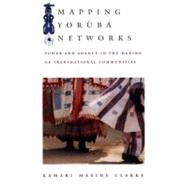Mapping Yoruba Networks
, by Clarke, Kamari Maxine- ISBN: 9780822333425 | 0822333422
- Cover: Paperback
- Copyright: 7/9/2004
Three flags fly in the palace courtyard of Òyótúnjí African Village. One represents black American emancipation from slavery, one black nationalism, and the other the establishment of an ancient Yorùbá Empire in the state of South Carolina. Located sixty-five miles southwest of Charleston, Òyótúnjí is a Yorùbá revivalist community founded in 1970. Mapping Yorùbá Networks is an innovative ethnography of Òyótúnjí and a theoretically sophisticated exploration of how Yorùbá Òrìsà voodoo religious practices are reworked as expressions of transnational racial politics. Drawing on several years of multi-sited fieldwork in the United States and Nigeria, Kamari Maxine Clarke describes Òyótúnjí in vivid detail-the physical space, government, rituals, language, and marriage and kinship practices-and explores how ideas of what constitutes the Yorùbá past are constructed. She highlights the connections between contemporary Yorùbá transatlantic religious networks and the post-1970s institutionalization of roots heritage in American social life. Examining how the development of a de-territorialized network of black cultural nationalists became aligned with a lucrative late-twentieth-century roots heritage market, Clarke explores the dynamics of Òyótúnjí Village's religious and tourist economy. She discusses how the community generates income through the sale of prophetic divinatory consultations, African market souvenirs-such as cloth, books, candles, and carvings-and fees for community-based tours and dining services. Clarke accompanied Òyótúnjí villagers to Nigeria, and she describes how these heritage travelers often returned home feeling that despite the separation of their ancestors from Africa as a result of transatlantic slavery, they-more than the Nigerian Yorùbá-are the true claimants to the ancestral history of the Great Òyó Empire of the Yorùbá people. Mapping Yorùbá Networks is a unique look at the political economy of homeland identification and the transnational construction and legitimization of ideas such as authenticity, ancestry, blackness, and tradition.






